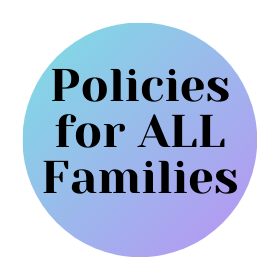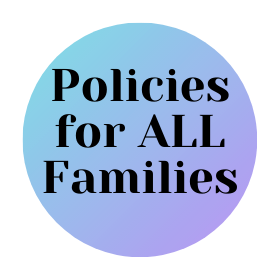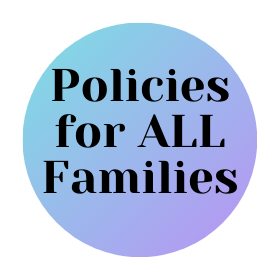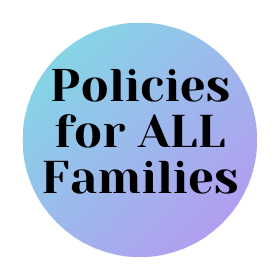
A bipartisan Congressional working group on paid leave invited ideas, and this is what Family and Home Network sent:
January 29, 2024
To: Bipartisan Congressional working group on paid leave
From: Catherine H. Myers, executive director, Family and Home Network
Current federal benefits for parents and family caregivers are egregiously lacking and those that do exist do not equitably and justly support families. The crisis of care cannot be solved by policies that support care only when it is done by people paid to do it, while ignoring the value of unpaid caregiving. Policies must fund care equitably.
Family and Home Network is in its 40th year as a grassroots, nonpartisan nonprofit organization offering parents affirmation, information and advocacy. With our Campaign for Inclusive Family Policies, we aim to establish this fundamental principle: family policy must include all families. Our decades of listening to parents and of engaging in cultural and political discourse compels us to respond to your mid-December request for ideas about paid leave policies.
We call on Congress to embrace core values of equity and justice, setting aside the “working families” framework that focuses singularly on paid care solutions. Looking through the narrow lens of “working families” results in discriminatory policies. For example: child care services are supported by billions of dollars in funding and by tax credits. Families with employed parents can qualify for federal and state Child Tax Credits, Dependent Care Tax Credit, or child care subsidies. Yet when a parent (or grandparent) gives care to a child, public policies fund that care at $0.
It’s important to recognize the imbalance of power and resources in family policy discussions. Those with ideological and/or economic interests in keeping parents in the waged workforce spend millions of dollars each year to influence public opinion and policymakers. They seek policies for “working families” and often misunderstand or misuse statistics. They fail to acknowledge that all caregivers, paid or unpaid, are doing essential work.
Families’ needs for caregiving vary greatly; some have family members who live with medical needs or disabilities that require a lot of caregiving, and many families find their caregiving needs changing over the years. People move in and out of the paid workforce in order to meet caregiving needs, and care must be supported whether families choose to use paid care services or provide the care themselves. Equity in government support for care is the path to freedom of choice about how to provide care. Congress must focus on creating family policies for ALL families.
Families’ income-earning and caregiving strategies are diverse. Infants, children, people of all ages needing care have diverse and often changing needs. Policies centered on “working families” overlook millions of families, including:
- those with an unpaid caregiving parent;
- parents who work as entrepreneurs or small business owners;
- parents who are students or temporarily unemployed;
- graduate students who exchange “work” for tuition and/or housing;
- retired grandparents stepping in to care for grandchildren;
- a parent who must step away from the paid workforce to care for an infant or child with special needs and/or complex medical conditions;
- parents who “tag team” with different employment schedules so they can provide all or most of the care for their children themselves;
- parents and caregivers whose jobs require nonstandard hours such as hospitals, hospitality industry, emergency services, and others;
- those who are temporarily unemployed;
- those families who rely on youth caregivers;
- and parents who are part-time employees or gig workers.
Policy must reflect this reality—and it can.
For families with a newborn or newly adopted child, we recommend Matt Bruenig’s proposal (People’s Policy Project). He explains: “parental leave would be understood as a benefit for children, with the benefit consisting of the care provided by their parents during leave. This also differs from conventional paid leave framing, which construes the program primarily as a benefit for working adults.” Bruenig’s plan, with benefits paid through the Social Security Administration, would be straightforward to administer, would acknowledge the critical importance of parent/child time together, and would free unpaid caregivers from the “family taxpayer” framework (an especially important factor for those parents fleeing a partners’ financial control or domestic violence). A federal “benefit for children” would not interfere with efforts by States or businesses to provide further support with their own paid leave policies.
Finland’s family policies are an excellent model for U.S. policymakers. Their inclusive policies use the term “Daily allowances for parents” to provide financial support for parents caring for an infant, whether they are taking a leave from employment or not currently earning income for any number of reasons. They have crafted policies that offer financial support for a range of circumstances, including for mothers during the final weeks of pregnancy, for parents who experience miscarriage or stillbirth, and for parents whose baby is in neonatal intensive care.
When U.S. parents are asked what kind of care they prefer for their infants and young children, a majority want to spend generous amounts of time caring for their children themselves. The Bipartisan Policy Center’s report, “Child Care Market Survey Analysis” (January 2021) found that only 39% of parents with children under the age of 5 said their ideal care arrangement is a childcare center or family day care. The majority chose "care for my child myself" (22%), care by spouse/partner (8%), by grandparent (9%), taking turns with spouse/partner to care for child (8%), part-day pre-K (9%) or other. Also, researchers report, “There was a 9% increase among Black parents and other parents of color between January and December 2020 who say their ideal child care arrangement is to provide care themselves for their youngest child.” Other surveys of parents also document the diversity of families’ needs and preferences.
Another critically important factor, often ignored in policy discussions, is the mountain of evidence from the science of human development that illuminates children’s needs. Parent-child time together is crucial in order to establish and maintain the intimate, two-way relationships that are essential for healthy development. Distinguished interdisciplinary researcher Darcia Narvaez, PhD explains: “human beings are a particular species with particular needs that, especially in early life, need to be fulfilled in order to construct an individual’s sociality and compassionate morality.” Utilizing lessons from neuroscience, psychology, and evolutionary biology, she illuminates the elements of humanity’s evolved nest. For babies these elements include responsive relationships (promoting calm, avoiding distress and discomfort), caregiver positive touch (holding, carrying), frequent, on demand breastfeeding, a welcoming community for babies and robust assistance for parents.
Currently, millions of U.S. families face enormous stress as they seek to provide the care their children need. Approximately one in five children live in poverty, a national disgrace that could and must be alleviated through better policies. The National Academies of Sciences report on poverty documents its harmful life-long impact on physical and mental health, as well as the long-term costs to local, state and national governments. Looking at the big picture, renowned doctors T. Berry Brazelton and Stanley I. Greenspan reminded us that "in order to protect the future for one child, we must protect it for all." As they point out, "Only secure, well-nurtured individuals are capable of joining together and embracing a broader ethic of shared humanity."
We call on Congress to adopt principles of inclusion to guide equitable and just policymaking. In order to create family policies for ALL families, policies that align with 21st century science on human development and well-being, a paradigm shift is required:
All care has value.
All care is work.
All care has costs, whether it’s provided by paid professionals or by family members.
All care must be equitably supported by public policies.
For more information and references, please see:
Inclusive family policies: Resources
Take action: send a message to the President, Vice-President and Congress: Make family policies for ALL families.


